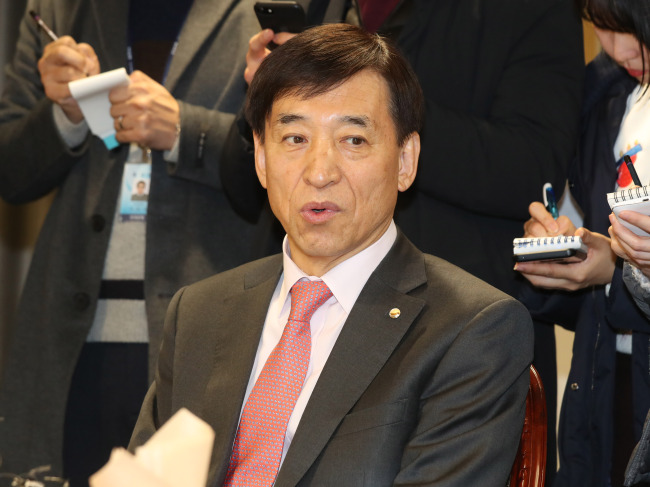South Korea‘s top monetary policymaker expressed concerns on what he called the nation’s “irrational exuberance” that may partly be blamed on the cryptocurrency frenzy among local retail investors, during a meeting with the press Wednesday night.
This comes in contrast to the “rational exuberance” seen in Korea’s bull financial markets, such as the record run in stock markets and flattening yield curve driven by robust fundamentals and a low key rate policy, said Bank of Korea Gov. Lee Ju-yeol.
Lee, however, said the expansionary monetary policy and following high financial liquidity, coupled with the cryptocurrency craze, might lead to credit expansion and subsequent asset bubble bursts in the long run.
 |
BOK Gov. Lee Ju-yeol (Yonhap) |
“The worldwide cryptocurrency craze inevitably invites concerns that the long-term financial expansionary policy has prompted irrational exuberance,” Lee told the press, borrowing the phrase used by the then- US Federal Reserve Board Chairman Alan Greenspan to describe the dot-com bubble of the 1990s.
“If the already-worsened financial imbalance and risk appetite persist, central banks in the world would be concerned about the following impacts.”
Lee reiterated that the BOK does not regard cryptocurrencies as a valid medium of payments. On the other hand, the central bank has been undergoing research to brace for cryptocurrencies’ impact on its main role as a monetary policymaker.
“We are not focusing on the way to impose regulations on cryptocurrencies or tame a sharp price surge,” Lee said. “What BOK focuses on is the cryptocurrencies’ impact on the way we craft and implement monetary policies, and the way these directions affect payment and settlement systems and financial stability.”
Such remarks came amid the government’s stance against cryptocurrency speculations by investors, largely individuals.
On Dec. 13, Korea‘s pangovernmental task force, including the central bank, unveiled a set of measures to tame cryptocurrency prices, while the next day the Financial Services Commission said a separate state-sponsored bill to consider cryptocurrency exchanges as illegal fundraisers was underway.
At around 3 p.m. Thursday, bitcoin, the de facto key cryptocurrency, was trading at 21.6 million won ($20,000) in Korea, about 20 percent higher than the world average, according to cryptocurrency price tracker Coinass.
Meanwhile, Lee on Thursday maintained a bullish outlook for economic growth in 2018 citing projections for robust readings in exports, while pledging to keep close tabs on external economic uncertainties such as rate hikes of foreign central banks and protectionism.
He said during an annual meeting to discuss economic direction with top economists that Korea would attain the goal of 3 percent economic growth this year with certainty, in the days of “hyper uncertainty” coupled with geopolitical threats from North Korea,
By Son Ji-hyoung (
consnow@heraldcorp.com)







![[Today’s K-pop] Blackpink’s Jennie, Lisa invited to Coachella as solo acts](http://res.heraldm.com/phpwas/restmb_idxmake.php?idx=644&simg=/content/image/2024/11/21/20241121050099_0.jpg)
